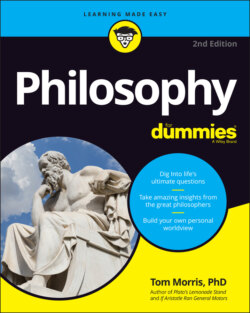Читать книгу Philosophy For Dummies - Tom Morris - Страница 60
Radical skepticism about the present
ОглавлениеThe thinker often referred to as the Father of Modern Philosophy, René Descartes (pronounced “Renay Day-Cart”) back in the 17th century offered his own radical suggestion. How do we know that the apparent objective life in the world we experience is not all an extraordinarily elaborate dream? The poet Robert Burns later picked up the idea with his own words, “Life and love are but a dream.” You could be dreaming that you are reading philosophy now. This skeptical reasoning you seem to be reading about could just be part of one big nightmare. Look at the room around you. Gaze down at your body and at what you’re wearing. How do you know that it’s not all just a dream? Modern filmmakers have taken up something like this idea with The Matrix franchise. Or maybe you just dreamed they did.
Descartes also toyed with the idea that present life could possibly all be one big delusion. Perhaps there is a very powerful evil demon who has hypnotized everyone, or just you, in case nobody else but you and the demon actually exist, deluding you to hold all these elaborate beliefs, and to seem to see and hear all the things they or you think are actually being experienced, moment to moment. You likely don’t for a second actually suspect that this might indeed be going on. But, again, why not? Philosopher Thomas Hobbes once referred to “The privilege of absurdity; to which no living creature is subject but man only.” And yes, it’s absurd. But the question is how we know it’s not also real.
The truth is, you cannot refute the Dream Hypothesis, or the Demon Hypothesis, or any such wild, comprehensive Matrix-type scenario. Do you then just live in a virtual, cosmic computer-type simulation? The surprising fact is that when you think about it hard enough, you come to realize that you can’t even come up with a single shred of positive, independent evidence that any of these radical scenarios is false. And yet everyone normally believes things that imply they are, in fact, false. This, the skeptic suggests, is a problem. You need some reason to think you’re right in having your ordinary beliefs, and denying these wild alternatives to be true, and yet you can’t seem to have any.
